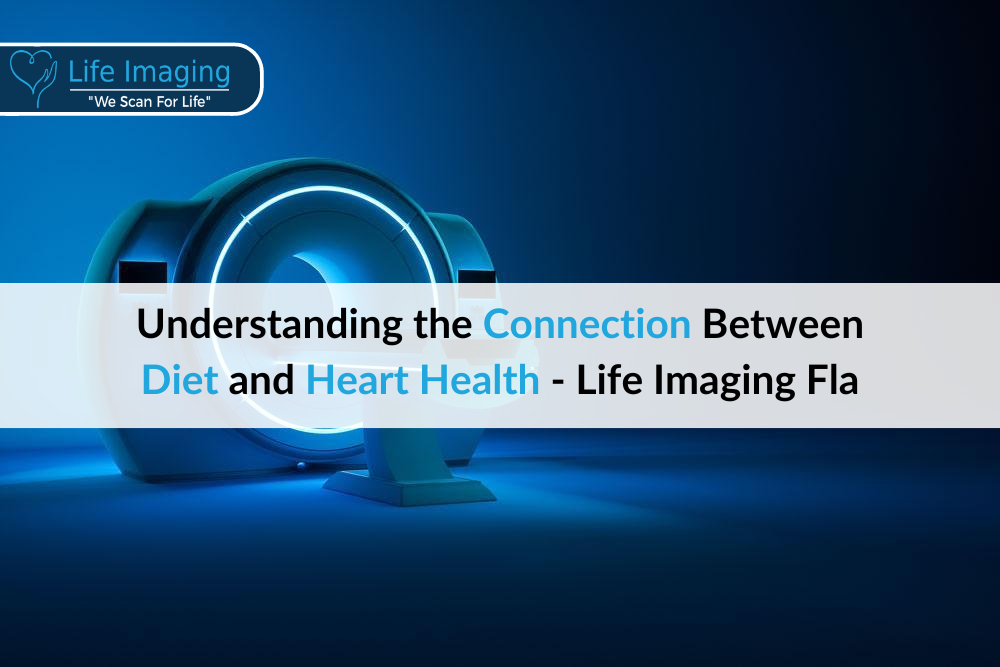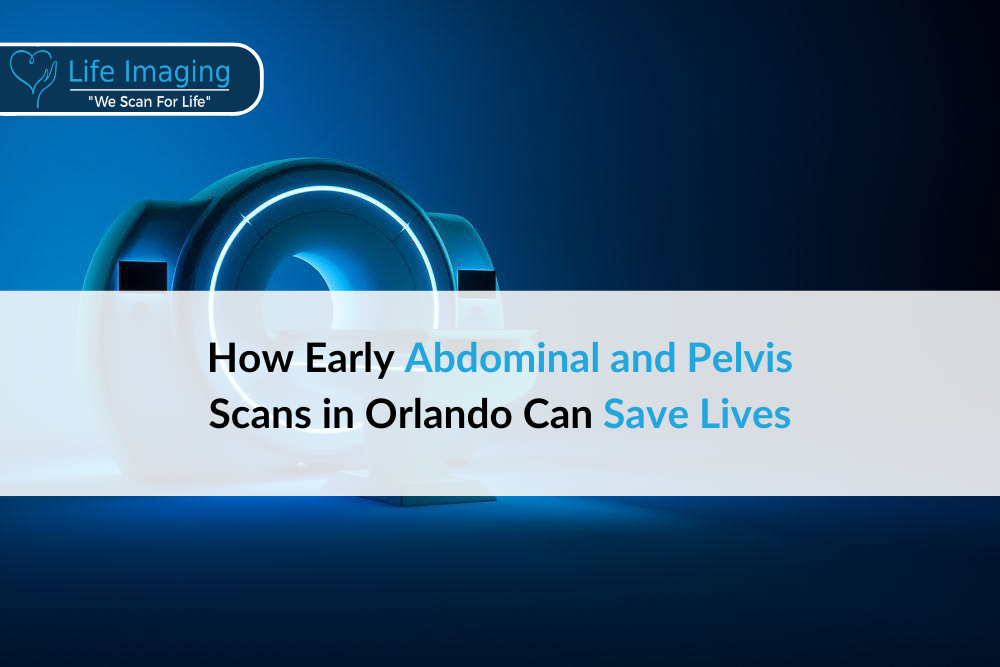
Steps to Take for Orlando Residents If Your Heart Scan Shows Abnormal Results
If you live in Orlando and recently had a heart
NOW OPEN! We’re excited to announce our new location in Jupiter, FL is now open! Learn more.

The heart, a small but powerful muscle, is the engine room of the body, pumping blood and supplying essential nutrients and oxygen to all parts of the body. However, it is also vulnerable to the choices we make, particularly when it comes to our diet. The link between diet and heart health is undeniable and understanding this connection can lead to better health outcomes and a potentially longer life.
At Life Imaging Fla, we recognize the importance of early detection of heart disease, and equally, the critical role diet plays in preventing heart conditions before they develop. The foods you choose to eat daily can either support heart health or contribute to heart disease. This article delves deep into how various dietary choices impact heart health, backed by scientific evidence and guided by expert opinions.
Let’s explore the beneficial foods that bolster heart health, the detrimental effects of poor dietary choices, and practical tips for creating a heart-healthy diet. Whether you’re currently struggling with heart health issues or are proactive about prevention, understanding the monumental effect of diet on heart health is a step towards a healthier future.
With a commitment to promoting optimal health, our imaging center offers insights that empower individuals to make informed dietary choices and support overall well-being. Join us as we unpack the complexities of diet and its direct impact on heart health.
Eating a variety of fruits and vegetables is one of the best choices you can make for your heart. These foods are high in vitamins, minerals, and antioxidants, all of which support heart health. They are also low in calories, which helps manage weight and reduces the burden on the heart.
The American Heart Association recommends filling at least half your plate with fruits and vegetables to prevent heart disease. These natural goodies reduce blood pressure and lower the risk of heart disease and stroke, making them a must-have in every meal.
Whole grains like oatmeal, brown rice, and whole wheat bread are excellent for heart health. They have more fiber than refined grains, such as white rice and white bread. Fiber helps lower cholesterol and keeps blood vessels in good condition.
A study published in the Journal of Nutrition suggests that eating three servings of whole grains daily can reduce the risk of heart disease by up to 25%. It’s essential to make smart carbohydrate choices by selecting whole grains over processed ones to keep your heart in good shape.
Saturated and trans fats are harmful to your heart. Foods like red meat, butter, cheese, and other full-fat dairy products contain saturated fats. Many baked goods and fried foods contain trans fats, which are even worse for heart health. These fats raise the level of LDL cholesterol (often referred to as “bad” cholesterol) in your blood, which can lead to plaque buildup in your arteries.
The American Heart Association recommends reducing saturated fat intake to less than 6% of total daily calories. Switching to healthier fats, like those found in olive oil, nuts, and fish, can protect your heart by lowering bad cholesterol levels and inflammation.
Too much salt in the diet can lead to high blood pressure, a major risk factor for cardiovascular disease. Most Americans consume too much sodium, much of it coming from packaged, processed foods. To keep your heart healthy, it’s important to limit salt intake to no more than 2,300 milligrams a day (about one teaspoon of salt). Reading food labels can help you spot high-sodium products and make better dietary choices. Opt for fresh or frozen vegetables instead of canned, and choose low-sodium or no-salt-added versions of products.
Incorporating these dietary changes, focusing on the intake of fruits, vegetables, whole grains, and reducing bad fats and sodium, can substantially lower the risk of heart disease. Adapting your diet to include heart-healthy foods, while eliminating harmful ones, can lead to improved cardiovascular health and a better quality of life.
One of the most beneficial nutrients for heart health is omega-3 fatty acids, found abundantly in fatty fish like salmon, mackerel, and sardines. Omega-3s are known to reduce inflammation throughout the body—a key contributor to the degradation of blood vessels. Additionally, these fatty acids help lower triglycerides, stabilize heart rhythm, and reduce blood pressure.
Studies, such as one published by the American Heart Association, recommend eating two servings of fatty fish per week as part of a heart-healthy diet. Incorporating these types of fish into your meals can make a substantial difference in your cardiovascular health.
When it comes to maintaining heart health, how much you eat can be just as important as what you eat—consuming more calories than you burn results in weight gain, which is a major risk factor for heart disease.
To manage portion sizes, try using smaller plates, reading food labels to check serving sizes, and eating more slowly to allow your brain time to recognize when your stomach is full. Also, focusing on filling half your plate with vegetables and fruits can keep portions of higher-calorie foods like meats and grains in check.
Excessive intake of sugar can have harmful effects on heart health. Sugary foods and beverages, such as soda, candy, and pastries, contribute to weight gain and can lead to higher triglyceride levels, which increase cardiovascular risk.
The American Heart Association advises limiting sugars to no more than six teaspoons per day for women and nine teaspoons per day for men. Being mindful of the sugar content in processed foods and opting for natural sweeteners like fruits can help manage sugar intake and support heart health.
Shifting towards a plant-based diet is another effective strategy for enhancing heart health. Plant-based diets are rich in fiber, vitamins, and minerals that help lower blood pressure and cholesterol. Foods like legumes, whole grains, nuts, seeds, and plenty of fruits and vegetables can dramatically improve heart health.
Research, including studies referenced by Harvard Health Publishing, shows that a predominantly plant-based diet can decrease the risk of heart disease by as much as 40%. Adopting a diet that includes more plant-based foods and fewer animal products can lead to significant health benefits, including a healthier heart.
Emphasizing these dietary strategies—enhancing your intake of omega-3 fatty acids, managing portion sizes, reducing sugar consumption, and increasing plant-based foods—are all actionable steps you can take to improve your heart health. Each choice you make at the dinner table can be a step toward a healthier heart.
In Orlando, where local produce is abundant, residents have access to a wide variety of fruits and vegetables that can help make these dietary changes easier and more enjoyable. By taking advantage of local resources and making informed food choices, you can take control of your health and reduce your risk of heart disease.
Cholesterol, a fatty substance found in some foods, is essential for good health but can be problematic when levels in the blood are too high. Dietary cholesterol comes mainly from animal sources, such as eggs, meat, and cheese. While it was once thought that eating foods high in cholesterol had a major impact on blood cholesterol levels, recent studies suggest that for most people, saturated fats and trans fats have a greater effect.
However, moderation is still key as some individuals may be more sensitive to dietary cholesterol. The American Heart Association recommends that if you consume foods high in cholesterol, do so in moderation to maintain a heart-healthy diet.
Antioxidants play a significant role in heart health by combating oxidative stress, which can damage cells and lead to heart disease. Foods rich in antioxidants include berries, dark chocolate, nuts, and green leafy vegetables. Incorporating these foods into your diet can protect your cardiovascular system by neutralizing harmful free radicals. For instance, the flavonoids in dark chocolate have been linked to lower rates of heart disease, provided the chocolate is at least 70% cocoa and consumed in moderation.
Drinking enough water is crucial for maintaining heart health. Water helps the heart pump blood more efficiently and aids in the prevention of dehydration, which can cause the heart to work harder. The general recommendation is to drink at least eight glasses of water a day, but needs can vary depending on the climate, physical activity levels, and personal health. Especially in Orlando’s warm climate, staying hydrated is crucial to prevent additional strain on your heart.
To make managing your diet easier, consider using apps or tools that track food intake and nutritional content. Many free apps allow you to log what you eat and monitor your intake of fats, sugars, cholesterol, and other nutrients important for heart health. These tools can be particularly helpful if you’re trying to make significant changes to your diet or if you need to monitor specific nutrients closely.
Implementing these dietary strategies and understanding the impact of various nutrients on heart health can empower you to make healthier choices. From the types of fats you eat to ensuring you stay hydrated and consume antioxidant-rich foods, every aspect of your diet plays a part in your overall cardiovascular health. By paying attention to what you eat and using tools to help track your diet, you can actively contribute to a healthier heart and a longer, more vibrant life.
The journey to a healthier heart is profoundly influenced by our daily diet choices. From embracing fruits, vegetables, and whole grains, to understanding the impacts of fats and sugars, each decision plays a critical role in cardiovascular health. Life Imaging Fla recognizes the power of preventative care and is dedicated to guiding you towards making choices that improve heart health and overall well-being.
Remember, changes to your diet have a direct effect on reducing your risk of heart disease and improving your quality of life. It’s about making smarter choices that benefit your heart and sticking to them consistently. Whether it’s opting for water over sugary drinks, incorporating more plant-based meals, or using digital tools to track your nutrition, every small step is a move toward a healthier heart.
At our imaging center in Orlando, FL, we are committed to supporting your heart health journey. Contact us to discover more about how our early detection services can complement your lifestyle changes, providing you with a comprehensive strategy for heart health.
Take control of your health today. Make heart-smart diet choices and schedule regular screenings with Life Imaging Fla—your heart will thank you for it. Let’s beat heart disease together, one healthy choice at a time!

If you live in Orlando and recently had a heart

Calcified lymph nodes are small, hard lumps that can develop

Low dose CT scanners are advanced tools that play a

Virtual colonography is an advanced way to check the health

Feeling anxious before a medical scan is common. Many people

Lung cancer is a serious disease that starts in the

* Get your free heart scan by confirming a few minimum requirements.
Our team will verify that you qualify before your scan is booked.
Copyright © 2025 Life Imaging – All Rights Reserved